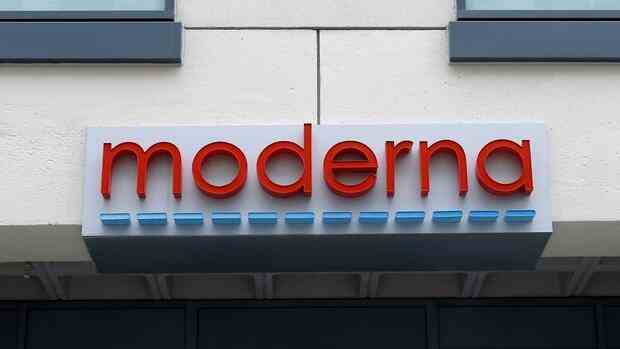Frankfurt The US biotech group Moderna has underpinned the performance of its mRNA technology with another positive study. Its vaccine candidate “mRNA-1345” against the respiratory syncytial virus (RSV) achieved a preliminary efficacy of almost 84 percent in a large phase 3 study, as Moderna announced late Tuesday evening.
The mRNA-based vaccine thus showed a similarly high level of effectiveness as competing vaccine candidates from Pfizer and GSK, for which data were published last year. Moderna plans to submit the vaccine for approval in the US and Europe in the first half of the year. Moderna shares are up more than 6 percent in response to the data in premarket trading Wednesday, adding more than $4 billion in market value.
Paul Burton, Medical Director of Moderna, evaluates the data as “really strong, robust and therefore very, very encouraging results” compared to the competing products. He believes Moderna is in a good position to compete in the future RSV vaccine market.
So far, no vaccines against the RS virus have been approved. The virus is considered a worldwide pathogen of acute diseases of the upper and lower respiratory tract. Most infections are harmless. But they can also become more dangerous, especially for the elderly and infants. The pathogen is held responsible for more than half a million hospital stays by adults in the western world.
Top jobs of the day
Find the best jobs now and
be notified by email.
The US agency CDC estimates that around 10,000 adults and 100 to 300 small children die of RSV infections in the US alone every year. The vaccine developers are therefore counting on the fact that they can cover a considerable unmet need with the new vaccines.
>> Also read: Biontech, for its part, is suing against Curevac’s patents
In addition to GSK and Pfizer, the US company Johnson & Johnson is also testing an RSV vaccine in advanced clinical trials. In addition, Sanofi and the British company Astra-Zeneca have submitted a jointly developed antibody against RSV for approval, which can also be used prophylactically.
Intense competition in the vaccine market
Overall, this new segment of the vaccine market is characterized by relatively intense competition, also on a technological level. Moderna’s mRNA vaccine faces protein-based vaccines from GSK and Pfizer and a vector vaccine from Johnson & Johnson.
The US company Moderna assumes that mRNA-based vaccines and drugs can be successful on a broad basis in the medium term.
(Photo: Reuters)
The study results are also of great importance to Moderna because they provide further evidence that mRNA technology can open up a broad field of application beyond Covid vaccines. The US company’s RSV study is the first successful phase 3 study with an mRNA vaccine against a pathogen other than Sars-CoV-2.
A few weeks ago, Moderna announced positive data from a phase 2 study with a cancer vaccine. The vaccine was then able to reduce the risk of recurrence in operated skin cancer patients by 44 percent and is now to be tested in a phase 3 study relevant for approval. Such test results support the assessment of many experts that mRNA-based vaccines and drugs can be successful on a broad basis in the medium term.
Moderna is fully committed to the concept and assumes that the success of the corona product can be repeated relatively quickly with other mRNA active ingredients in comparable therapeutic fields. The RSV study seems to confirm this strategy.
The group is currently also testing vaccines against the cytomegalovirus and against influenza in studies relevant to approval. A number of other vaccine projects are in earlier stages of development. In oncology, too, after initial success in skin cancer, the company intends to quickly start further studies in other types of cancer.
The Mainz-based company Biontech is also pursuing a similar concept, which, after its success in developing the Covid vaccine, has also started a series of vaccine projects, for example in the areas of flu and malaria. Biontech is also testing various mRNA products in clinical studies in the field of oncology. However, the Mainz-based company also relies on other technologies such as antibodies and cell therapies for cancer diseases. Despite the success of its mRNA-based Covid drug, Biontech sees itself as a multi-technology company.
The expected advantage for the mRNA technology results primarily from the fact that with its help body cells can in principle be stimulated to produce any proteins and corresponding mRNA constructs can be generated relatively quickly in the laboratory. The technique is therefore very flexible, although the basic structure of the mRNA active substances always remains the same. They consist of a strand of mRNA wrapped in a lipid envelope.
From the point of view of the mRNA protagonists, this in turn promises relatively comparable safety profiles for the different products. According to Moderna manager Burton, this was also confirmed in the RSV study. Overall, the vaccine is well tolerated and has not raised any safety concerns. It is assumed that overall it will show a similarly favorable side effect profile as the Covid vaccine that has been used millions of times.
More: Biontech and Moderna: Expansion race of the corona vaccine manufacturers
